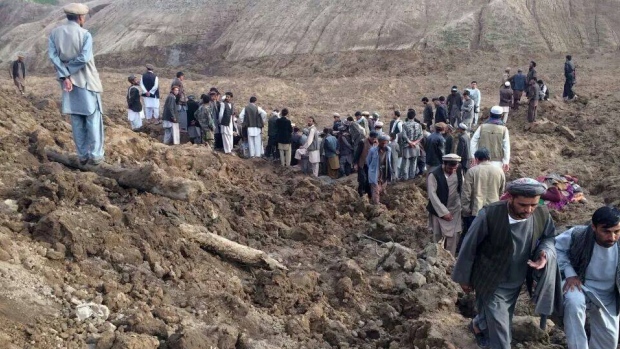Afghan Landslide Takes At Least 2,500 Lives
By Countercurrents
03 May, 2014
Countercurrents.org

Death toll in the Afghan landslide has risen to at least 2,500. Thousands of Afghan people in the north-eastern mountain village are still missing. Hundreds of people are now camped out overnight in near-freezing conditions, although some were given tents. Officials distributed food and water.
The Catastrophic landslip took place in the village of Hobo Barik, and it is reported that about a third of the village has been wiped out. Most of the people would have been home as it was a day of worship.
Media reports said:
Afghan officials have given up hope on May 3, 2014 of finding any survivors from a landslide in the remote northeast, putting the death toll at more than 2,100, as the aid effort focused on the more than 4,000 people displaced.
However, there were reports of burial of at least 2,500 persons in the landslide.
Officials expressed concern the unstable hillside above the site of the disaster may cave in again, threatening the thousands of homeless and hundreds of rescue workers who have arrived in Badakhshan province, bordering Tajikistan.
"More than 2,100 people from 300 families are dead," Naweed Forotan, a spokesman for the Badakhshan provincial governor.
Villagers and a few dozen police, equipped with only basic digging tools, resumed their search when daylight broke but it soon became clear there was no hope of finding survivors buried in up to 100 meters of mud.
The United Nations mission in Afghanistan said the focus was on the more than 4,000 people displaced, either directly as a result of the May 2, 2014 landslide or as a precautionary measure from villages assessed to be at risk.
The impoverished area, dotted with villages of mud-brick homes nestled in valleys beside bare slopes, has been hit by several landslides in recent years.
The side of the mountain above Ab Barak collapsed at around 11 a.m. (0630 GMT) on May 2, 2014 as people were trying to recover belongings and livestock after a smaller landslip hit a few hours earlier.
Hundreds of homes were destroyed in the landslides that were triggered by torrential rain. Officials worry another section of the mountainside could collapse.
The Afghan military flew rescue teams to the area on May 3, 2014 as the remote mountain region is served by only narrow, poor roads which have themselves been damaged by more than a week of heavy rain.
"We have managed to get one excavator into the area, but digging looks helpless," Colonel Abdul Qadeer Sayad, a deputy police chief of Badakhshan, told Reuters.
He said the sheer size of the area affected, and the depth of the mud, meant that only modern machinery could help.
NATO-led coalition troops are on standby to assist but on May 3, 2014 said the Afghan government had not asked for help.
Afghan rescuers and hundreds of volunteers armed with shovels rushed on May 3, 2014 to help villagers hit by the massive landslide.
Friday's damage was actually caused by two landslides from the hilly terrain. The first, smaller one covered a few houses. When people rushed in to help, a second, bigger landslide came down, burying the rescuers and more houses.
Rescuers have struggled to reach the remote area in northeastern Afghanistan, where there is little development or infrastructure. Heavy rains earlier this week contributed to the landslide.
In addition to the wars and fighting that have plagued Afghanistan for roughly three decades, the country has been subject to repeated natural disasters including landslides and avalanches.
Seven people were pulled alive from the mud and debris that flattened and leveled homes, but rescuers don't believe that anyone else could be alive beneath the piles of earth, the Independent reports.
The Badakshan province, which shares borders with China and sits nestled in the Hindu Kush and Pamir Mountain, is one of the most remote parts of the country.
Comments are moderated
